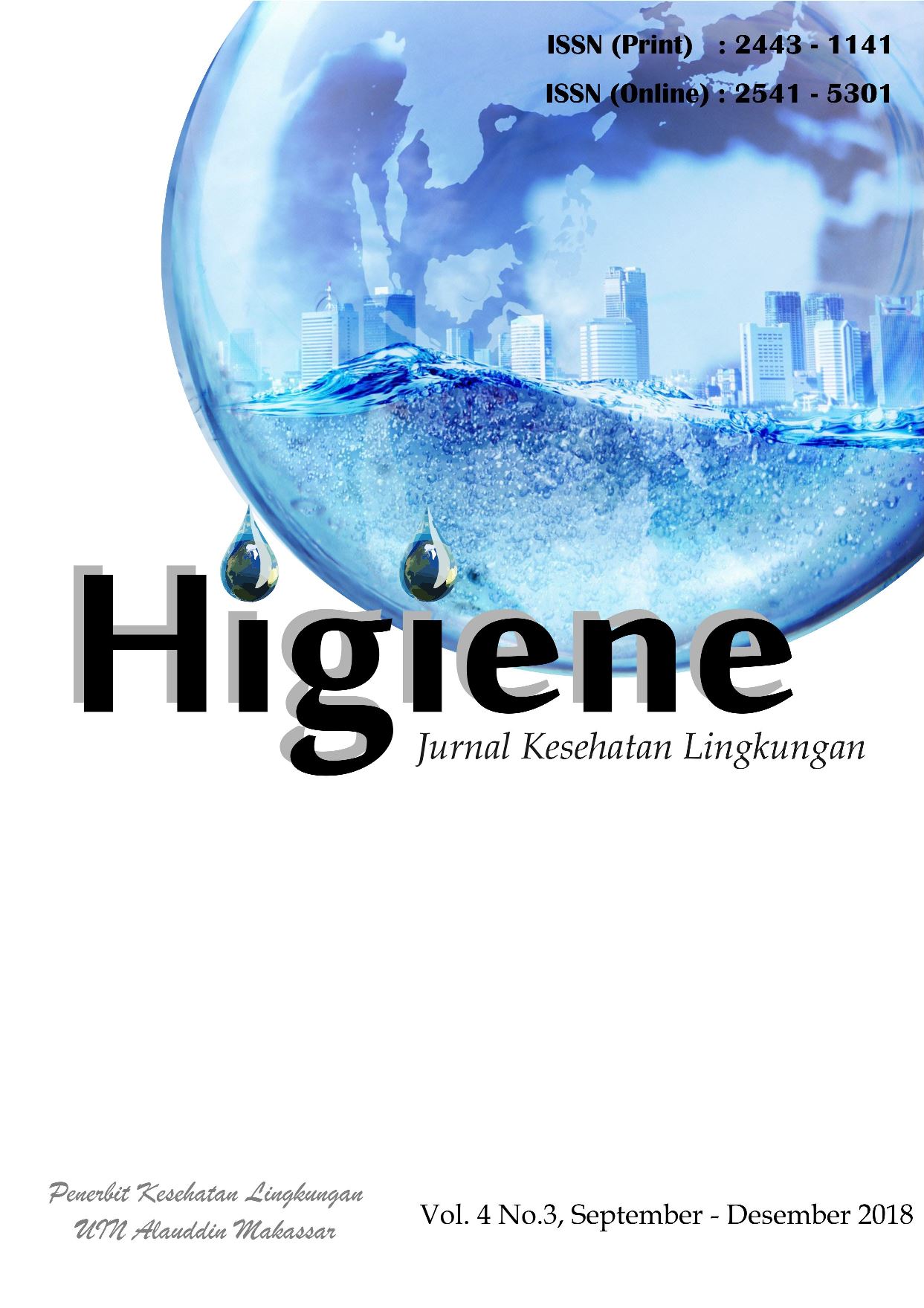Kualitas Bakteriologis dan Higiene Sanitasi Pada Depot Air Minum Isi Ulang di Wilayah Kerja Puskesmas II Denpasar Barat
Abstract
The existence of Drinking Water Refill Depot (DAMIU) continues to increase appropriate with the dynamics of community needs for drinking water that has good quality and safe for consumption. Although it had a low price, not all DAMIU product guaranteed safety. DAMIU as an alternative choice to fulfill the community needs for drinking water becomes a risk that harmful to health if producen did not pay attention in DAMIU hygiene and sanitation. The purpose of this study was to analyze quality of bacteriological and sanitation hygiene at refill drinking water depot in Puskesmas II West Denpasar. Design of this research is descriptive correlation with cross sectional method. Sampling technique of this research is non probability sampling technique that is purposive sampling with 16 sample people. Collection data using a worker's hygiene questionnaire and environmental sanitation at refill drinking water depot and Laboratory inspection instruments with MPN E. coli and MPN Coliform Parameters. Data processing using Chi Square test to determine whether or not the correlation between two variables. Results of the study were from 16 samples of 14 (87.5%) qualified in bacteriological quality and 13 (81.2%) qualified in sanitary hygiene. The concluded was a significant correlation between bacteriological quality and sanitation hygiene at refill drinking water depot in Puskesmas II West Denpasar (p value of 0.002 <0.05). From the results advisable for drinking water refill operators to always implement hygiene behavior that include clean living behavior and for Denpasar Health Department to keep performing its role in conducting guidance and supervision of sanitary hygiene problem DAMIU periodically both physical inspection and water quality.
Keywords: DAMIU, Hygiene Sanitation, Quality of Bacteriological
References
Apriliana E., M.R. Ramadhian, M. Gapila. 2014. Bakteriological Quality Of Refill Drinking Water At Refill Drinking Water Depotts In Bandar Lampung. Jurnal Kedokteran, 4(7): 142-146
Astri Wulandari Pratiwi, 2017. Kualitas Bakteriologis Air Minum Isi Ulang di Wilayah Kota Bogor. Jurnal Kesehatan Masyarakat Nasional Vol2, No 2,Oktober 2007
Depkes RI. 2002. Permenkes RI No. 907/MENKES/SK/VII/2002. Tentang Syarat-Syarat dan Pengawasan Kualitas Air Minum, Depkes RI. Jakarta.
Kurniawan.(2009). Analisis Kualitas Air Sungai Krakat di Kabupaten Sragen dengan Indikator Nilai Coliform Non Fecal Setelah Diberi Perlakuan dengan Eceng Gondok (Eichhornia crassipes Mart.Solms). Skripsi Universitas Muhammadiyah Surakarta.
Kurniadi, Y., Zulfan, S dan Dedi, A. (2013). Faktor Kontaminasi Bakteri E.coli pada Makanan Jajanan Di Lingkungan Kantin Sekolah Dasar Wilayah Kecamatan Bangkinang. Jurnal Lingkungan.7 (1).
Natalia, L.A., Bintari, S.H., dan Mustikaningtyas, D. (2014). Kajian Kualitas Bakteriologis Air Minum Isi Ulang Di Kabupaten Blora. Unnes Journal of Life Science. 3 (1) : 32-34.
Partiana, (2015). Kualitas Bakteriologis Air Minum Isi Ulang Pada Tingkat Produsen Di Kabupaten Badung. Jurnal Ilmu Lingkungan Vol. 9 No 2
Permenkes RI. 2014. Permenkes RI No. 43/MENKES/PER/IX/2014. Tentang Higiene Sanitasi Depot Air Minum. Jakarta, Kementrian Kesehatan Republik Indonesia.
Permenkes RI. 2010. Permenkes RI no. 492/Menkes/Per/IV/2010. Tentang persyaratan kualitas air minum. Jakarta, Kementrian Kesehatan Republik Indonesia.
Pramudya, Oka (2016). Gambaran Dukungan Keluarga Terhadap Kepatuhan Pasien Usia Lanjut Dalam Pemeriksaan Tekanan Darah Rutin di Wilayah Kerja Puskesmas Kedungbanteng Kabupaten Banyumas. Thesis Universitas Muhammadiyah Purwokerto.
Wandrivel.Netty Suharti, dan Yuniar Lestari (2012).Kualitas Air Minum Yang Diproduksi Depot Air Minum Isi Ulang Di Kecamatan Bagus Padang
Copyright (c) 2019 HIGIENE: Jurnal Kesehatan Lingkungan

This work is licensed under a Creative Commons Attribution 4.0 International License.


